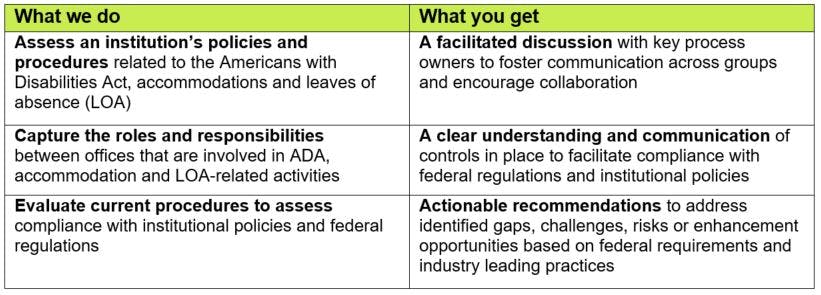
Protecting your institution from violating ADA requirements
Student mental health matters have continued to be a growing concern for students, administrators and parents at colleges and universities, as well as K-12 school districts, across the country. As students transition to undergraduate education, they are met with a variety of added stressors, such as academic, financial and social burdens. And the COVID-19 pandemic has further exacerbated mental and physical wellness concerns. Students have reported feelings of sadness, anxiety, depression and increased stress. As a result, institutions have seen more students taking voluntary or involuntary leaves of absence (LOA) as well as an increase in the need for accommodations (e.g., extended time for test taking). The barriers that students with impairments face are unique and ever-changing. Some disorders require physical accommodations, such as the need for a note taker or enhanced hearing devices. However, in some instances, the need for an accommodation is related to human interaction and social aspects (i.e., feelings of acceptance and inclusion). Both structural and social impairments are protected by the Americans with Disabilities Act (ADA). The Act is a civil rights law that prohibits discrimination against individuals with impairments in all areas of public life, including jobs, schools, transportation and all public and private places that are open to the public. The law is intended to ensure that individuals with any type of disability have equal rights and opportunities, and is comprised of five titles that specifically define these protections.
It is vital for institutions to have effective mental health programs and resources in place. This may include, but is not limited to, clear and transparent policies and procedures, sound communication mechanisms between key departments across the institution, training and education regarding available resources and student options and a resource to manage leaves of absences as well as the transition back to the institution. Without effective proven structure and approach, some institutions may find themselves in legal, financial and reputational trouble.
We have seen institutions suffer as a result of investigations by the U.S. Justice Department. While citations may be extremely costly and impose a financial hardship, institutions must also be prepared to align resources and increase efforts to improve operations. This may include increasing ADA and mental health training for faculty and staff, revising institutional policies and procedures and ensuring governance and oversight to enforce the revisions. Having a framework and system in place will mitigate financial, operational and arguably the most significant: reputational damages.
Baker Tilly can help
Baker Tilly can help institutions take a proactive approach to evaluate the current state of your policies, processes, internal controls and definitions related to ADA compliance. As a result of conducting an assessment, we can identify enhancement opportunities, recommendations for improvement and procedures to achieve compliance with the requirements.
For more information, or to learn more about how Baker Tilly's higher education team can help your institution, contact our team.
ADA National Network, What is the Americans with Disabilities Act (ADA)?

